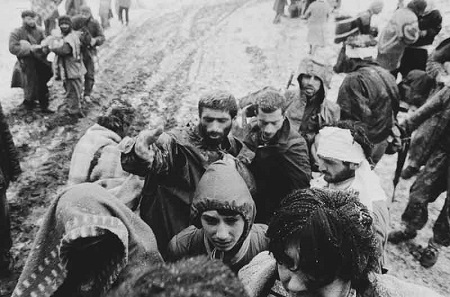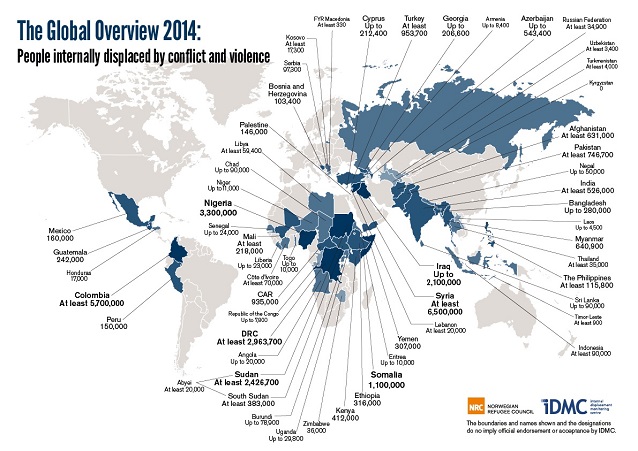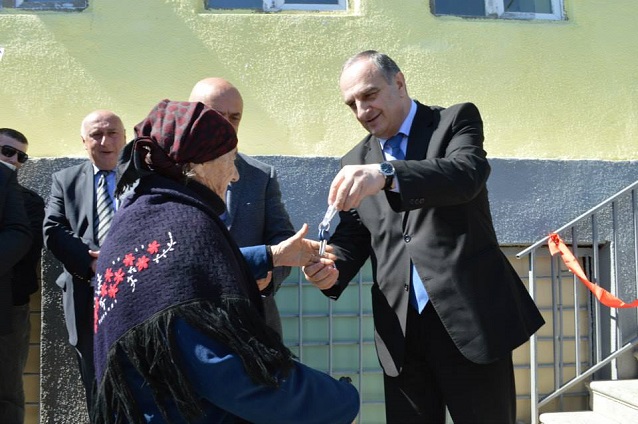UN report shows more than 206,000 IDPs in Georgia still displaced by Russian occupation

The quality of life of internally displaced persons (IDPs) in Georgia has improved following law changes and Government-funded housing improvements for people displaced by conflict and violence.
The recent changes and the current state of IDPs in Georgia were outlined in a report released today by the UN Internal Displacement Monitoring Centre (IDMC).
Some of the main issues facing Georgian IDPs was access to adequate housing, employment, and segregated education or lack of education for young IDPs.
The Global Overview 2014 report stated there were up to 206,600 IDPs registered by in Georgia at the end of 2013.
In the wider Europe region, where Georgia is classified, 2.2 million people were displaced by conflict and violence last year. On a global scale, there were 33.3 million IDPs at the end of last year. According to the report, the country with highest number of IDPs is Syria,( 6.5 million). Macedonia has the lowest number of IDPs in the world (up to 300).

World map with the IDPs data by the Internal Displacement Monitoring Centre.
"Talks on humanitarian issues between Georgia and Russia and the de facto authorities in South Ossetia and Abkhazia continued in 2013 but did not achieve any concrete results for IDPs,” the report said.
The Georgian Government implemented a number of initiatives to positively benefit IDPs and their quality of life. This included broadening the definition of IDPs and execution of a project to improve IDP housing, as "access to adequate housing remained the primary concern for IDPs in Georgia”, the report stated.
To combat this, by the end of 2013 the Government had allocated new housing units to more than 1,500 families, and registered the ownership of around 1,400 families’ living spaces in more than 125 collective centres.
The report praised this action but said more still needed to be done. In the Caucasus region more than 200,000 still lived in overcrowded and dilapidated collective centres where they were housed when they were first displaced.
Georgia’s actions to revise its law on internal displacement to accommodate a needs-based approach, in terms of housing, employment and financial assistance, were also recognized in the report.

Georgian Minister of refugees David Darakhvelidze gives the keys of the new house to the woman displaced from Abkhazia in Zugdidi. Photo by Ministry's Press office.
It acknowledged the Ministry ofInternally Displaced Persons from the Occupied Territories, Accommodation and Refugees of Georgia was in the process of developing a strategy within the current action plan to further assist the displaced population.Some of the main issues currently facing the Georgian IDP population was lack of employment, segregated education or lack of education for young IDPs. In cases of poverty, girls particularly were forced into early marriage or removed from school to help earn an income.
The report said IDPs were also "disadvantaged in terms of access to land and property”.
"It showed their income levels were equal or slightly higher than poor households in general population, but many continued to rely on state subsidies, such as the monthly allowance for IDPs, as their main source of income,” the report said.
The future of Georgian IDPs remained uncertain as the majority were unable to return to their homeland.
"In the absence of peace agreements, return remained impossible for most of those displaced in Azerbaijan, Georgia and Cyprus, and peace negotiations made no progress during the year.”
"With the exception of the Abkhaz district of Gali, the de facto authorities in South Ossetia and Abkhazia refuse to allow IDPs to return on the basis that a large influx of Georgians would upset the ethnic balance and compromise security.”
Similarly, those who returned to areas near the dividing line with South Ossetia were increasingly prevented from accessing homes, land, water and livelihoods in 2013, by the installation of a 50km fence by Russian and South Ossetian soldiers, the report stated.
Meanwhile humanitarian aid for the region in 2013 dropped to its lowest point in nine years (from $47 million in 2012 to $33 million in 2013) as government’s assumed greater financial responsibility for IDPs.
The report said IDPs’ needs were "no longer humanitarian as they mainly relate to housing and jobs”. The report’s authors believed the development sector should "step up its engagement in these areas”.
Meanwhile the United Nation’s special rapporteur on IDPs’ human rights, Chaloka Beyani, visited Georgia last year. After monitoring the situation he focused on the need for durable solutions and called the Government to improve its efforts to resolve IDPs’ problems with housing, livelihoods, jobs, services and property, and to ensure they could participate in elections.
 Tweet
Tweet  Share
Share